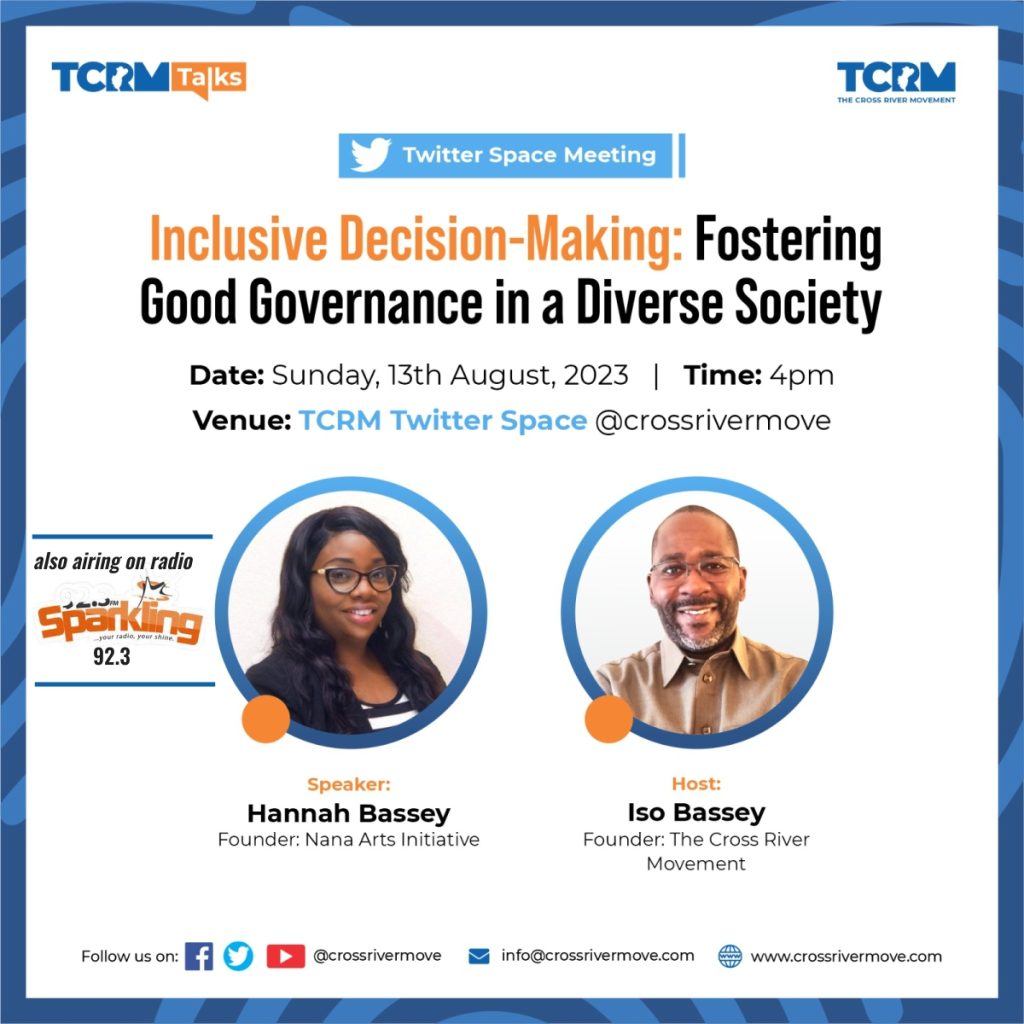Grassroot dwellers and communities in Cross River State have been given a resounding call to champion the cause of good governance within their domains. This clarion call echoed through the virtual halls of the August edition of the Cross River Movement (TCRM) stakeholder Twitter space, under the enlightening theme of “Inclusive Decision-Making: Fostering Good Governance in a Diverse Society.”

The engagement, held on a Sunday, brought together a diverse array of stakeholders committed to the advancement of governance that truly serves all members of society. Mrs. Hannah Bassey, the distinguished guest speaker and founder of Nana Arts Initiative, delivered a compelling address. She highlighted that while the government possesses the constitutional duty to provide good governance, the responsibility also rests upon the shoulders of the citizenry to ensure that effective leadership prevails. Mrs. Bassey underlined the imperative of enshrining fair legal frameworks and enforceable policies that benefit all citizens, with a particular emphasis on inclusivity for women and other vulnerable groups in the decision-making process.
Mrs. Bassey’s insightful message echoed the sentiment that communities hold an integral role in shaping governance. She advocated for communities to assert their voices and advocate for leaders based on their track records, antecedents, and credibility. To achieve this, she stressed the importance of conducting community stakeholder dialogues that bring together citizens from various sectors, fostering awareness and active participation.
In response to this, Mr. Kenneth Kejang, the Chairman of the National Youth Council’s Ikom chapter, shared his perspective. He emphasized that leadership, especially at the local government level, should be entrusted to individuals with proven records of passion for good governance. He passionately advocated for youth leaders to be granted the platform to express their views, contributing significantly to the betterment of governance at the grassroots level.
In light of these discussions, stakeholders presented a set of recommendations. They directed a call to action towards the State Governor, Sen. Bassey Edet Otu, urging him to engage in dialogues with Cross Riverians. These dialogues are to encompass a broad spectrum of societal groups, ranging from women’s associations and professional bodies to youth organizations and other vulnerable demographics. The aim of these dialogues is to collectively pave the way forward for the State, acknowledging that inclusive decision-making is key to a prosperous future.
Inclusivity: A Pillar of Effective Governance
Inclusive decision-making stands as a cornerstone in establishing and maintaining a sturdy governance structure, particularly in a diverse society such as Nigeria. This concept champions the importance of involving a wide array of perspectives and voices, ensuring that policies and choices are not only responsive but also reflective of the entire citizenry’s needs and aspirations. This article delves into the critical role of inclusive decision-making in fostering good governance, placing particular emphasis on the Nigerian context and, more specifically, Cross River State.
Navigating Challenges: Ensuring Voices are Heard
Nigeria’s diverse landscape offers both opportunities and challenges. Integrating the voices of varying ethnic groups, regions, and socio-economic strata into the decision-making process is a formidable task. Historical inequalities in representation and limited access to decision-making platforms have contributed to feelings of marginalization and exclusion. These challenges have often culminated in policies that inadequately address the diverse needs of different segments of the population.
Seizing Opportunities: Embracing Inclusivity
However, recent years have seen Nigeria’s stride towards embracing inclusivity. The shift towards participatory democracy, the engagement of civil society, and the surge of technological advancements have collectively broadened the spectrum of citizens participating in governance. Cross River State, renowned for its cultural diversity, has proactively championed inclusivity through platforms encouraging citizens to voice their opinions and concerns.
Strategies for Fostering Inclusivity
- Legislative Reforms: The bedrock of inclusive governance involves fortifying laws that emphasize equal representation and safeguard the rights of minority groups, creating a solid framework for inclusivity.
- Civil Society Engagement: Collaboration with non-governmental organizations ensures that marginalized voices are both heard and genuinely considered, contributing to a well-rounded decision-making process.
- Technological Innovation: The leverage of digital platforms, with their potential to transcend geographical barriers, encourages wider participation in decision-making processes, fostering inclusivity.
- Civic Education: The promotion of awareness and education regarding the vital importance of inclusivity empowers citizens to actively demand representation and accountability.
In conclusion, the stakeholder engagement in Cross River State amplifies the significance of inclusive decision-making in fostering effective governance. The challenges of representation are not insurmountable; rather, they serve as a reminder of the ongoing journey towards realizing a governance structure that represents and serves every individual within society. By embracing inclusivity, Cross River State and Nigeria as a whole can harness the power of diverse perspectives to propel governance into a brighter future, where transparency, equity, and progress reign supreme.
Click the link to take the short quiz on Inclusive Decision-Making: Fostering Good Governance in a Diverse Society
TCRM QUIZ
